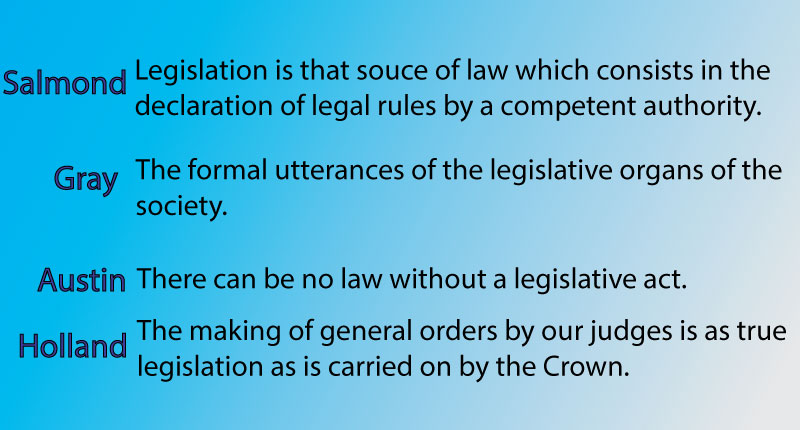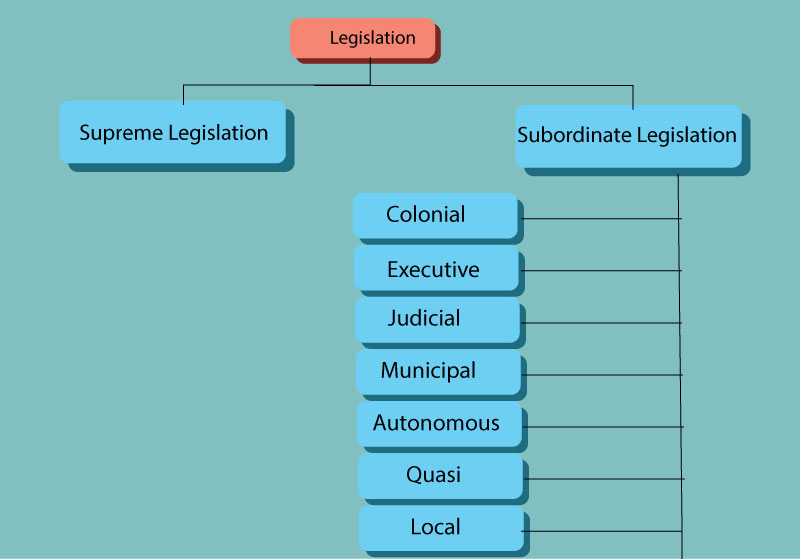In this article, we will talk about legislation, different types of legislation emphasizing on delegated legislation, advantages of legislation and many more.
Legislation is one of the major sources of law. The Origin of the term Legislation is from Latin. It consists of two words, legis and latum. Legis means law and latum means to make. So, if we combine these two then we get the meaning of legislation. So, legislation means, to make law.
Definition of Legislation
There are many definitions of legislation given by many jurists. Here are some opinions of jurists regarding legislation.
The analytical school or imperative school treats legislation as the major and main source of law.
Types of Legislation
There are two major types of legislation. They are
- Supreme legislation: Supreme legislation is also called primary legislation. Primary legislations are that legislation that is made by the sovereign or the legislative body. These can’t be repealed, annulled, or controlled other than the sovereign itself.
- Subordinate Legislation: This is also called secondary legislation. Subordinate legislations or secondary legislations are made after getting approved by the supreme legislation. These legislations can be in the form of rules, regulations, orders, codes, notifications, etc. These can be repealed. In modern time, the pressure on the legislature body are exorbitant and to reduce it subordinate legislation plays an important role.
Types of Subordinate Legislation
There are many types of subordinate legislation.
- Colonial Legislation
- Executive Legislation or Delegated Legislation
- Judicial Legislation
- Municipal Legislation
- Autonomous Legislation
- Quasi Legislation
- Local Legislation
Colonial Legislation
This legislation has much more impact than any other legislation. But the importance of it has diminished with the failure of colonialism. Laws made by the parent state for colonies are called colonial legislation. For example, when the British were ruling in India, they used to bring the laws and implemented in India. Even today in the Indian Subcontinent there are many laws that exist due to colonial legislation.
Executive Legislation or Delegated Legislation
Laws made by the executive on the authorization of legislature are called executive legislation or delegated legislation. Delegation to delegate or extend the power to another person. So delegated legislation means when the legislature extends its power to the executive for making law is called delegated legislation.
Delegated legislation is mentioned in the constitution itself. Article 123 of the Indian Constitution gives the power to the president to make an ordinance. In the constitution of Bangladesh, this power is mentioned in Article 93.
Importance of Delegated Legislation
There are many reasons why delegated legislation is so popular. Here are some of them
1.Pressure Upon Parliamentary Time: Parliament time is so precious. To reduce the time it is so important to delegate the power to the executive.
2.Technicalities of Factors: Parliament has to make different types of law, from medical related law to sky related law and many more. But not all parliamentary members are aware of these and how these works. That’s why parliament needs support from expert personnel. Executive body can support parliament in these cases.
3.Flexibillity: This legislation ensures flexibility.
4.Experimentation: The legislature can’t do many experiments. But the executive can.
5.Emergency Situations: In emergency situations, the executives are more open to people than the legislature. Because executives work with people and know more about them and their situations.
Apart from these, there are many reasons like, complexity of modern administration, local requirements, confidentiality or secrecy, unforeseen contingencies, action involving discretionary (to avoid arbitrariness), speediness, public interest and many more.
Classification of Delegated Legislation
There are five classifications of delegated legislation. They are
i)Title-based: If any rules, regulations, bye-laws, notifications, schemes, orders, ordinance, directions, etc are deleted to executive from the legislature then it is called title-based delegated legislation.
ii)Discretion-based classification: If there is any conditions or contingents involved, then those are called discretion-based delegate legislation.
iii)Purpose-based: If legislature bring legislation to executive and executive decides its applicability, non-applicability, date of implementation, etc, these are called purpose-based delegated legislation.
iv)Authority-based: If the senior executives delegate legislation to junior executives then it is called authority-based or sub-delegation.
v)Nature-based: This is called exceptional delegation.
Types of Delegated Legislation
There are four types of delegated legislation.
1.Normal: This one is divided into two parts.
i)Positive Delegation: When the legislative body clearly define in which fields the executives need to make law then it is positive delegated legislation.
ii)Negative: There are some topics where the executives can’t make any laws. This is called negative delegated legislation. For example, constitution related articles, taxation, amending parliamentary laws etc.
2.Exceptional Delegation: There are some important aspects regarding exceptional delegation. These are
i) To magistrate on matter of principle or to impose taxation
ii) The power to amend parliament
iii)Parliament forbidding judicial control
3.Henry VIII Clause: This was mainly for 16th century. King Henry told the executives to add or delete a particular law if they don’t like it provided that it had to be done smoothly. But there were many criticism against this statement.
4.Exclusion Clause: Executive can make rules or regulations which can not be questioned by court of law.
Control over Delegated Legislation
Delegated Legislation can be controlled by the following ways
- Parliamentary Control and Supervision: We have already talked about negative delegation. Apart from that, in every case, parliament has control over executives. A bill can be amended or repealed by the parliament and laws made by the executive should be approved by the legislature.
- Judicial Control: Courts can repeal any laws made by the executive by applying the doctrine of ultra vires. The court has some special power over the executive like writs, injunctions, and declarations.
- Trustworthy body or Expert’s opinion: In technical matters, internal control of delegated legislation can be happened by expert personnel.
Judicial Legislation
The power to lay procedures by the superior courts is called judicial legislation. For example, the High Court or Supreme Court’s rule making for the regulation of own procedure is called judicial legislation. According to many jurists, this is the true form of legislation.
Municipal Legislation
Authority given to municipals to make law is called municipal legislation. For example: Bye-laws. Municipals are permitted to make law for a particular area only. They can’t make law for other area.
Autonomous Legislation
Laws applicable to an autonomous group of individuals are called autonomous legislation. For example: Universities, companies, or railway companies, etc. Basically varsity authorities make laws or statutes for the government of its members and students. These laws are autonomous legislation.
Quasi Legislation
This type of legislation is mostly consists of books or rules and used in police department or highway.
Local Legislation
This type of legislation mostly goes with our subcontinent. Like in India, there are panchayats and local governments and laws made by these types of institutions are called local legislation.
Advantages of Legislation
There are many advantages of legislation.
1.Constitutive: This is the direct and primary source of law.
2.Abrogation: Legislation has abrogation power that means it can replace any laws made by itself too.
3.Division of Function: Legislation has sufficient source of data collection or public opinion.
4.Prospective nature: Legislation is prospective in nature.
5.Certain: All the laws made by the legislature are clear and precise.
6. Known in Advance: Before any laws are finalized, people know about it because there are so many discussion go on regarding finalized an act or law.
7.Futuristic: As people know about it, it is anticipatory.
8. Flexible: When people ask for any change legislature change it. That’s why it is flexible.
9.Public Opinion: As the legislative bodies are elected by people most of the cases, that’s why public opinion is the most important thing here.
10. Rectification is easy: As the legislature has the power that’s why rectification is so easy.
11. Natural Justice: Legislation meets the criteria of natural justice because people already know about any law before finalizing it.
12.Abolishing or changing Customs: Not all customs are good for people. There were many customs which were too atrocious in nature and still people used to abide by those. Legislature can change these customs. Like, Sati, Child Marriage, Widow Marriage these are few of them. These changes were for the sake of people.
These are the advantages of legislation.
These were all about legislation as a source of law. To read more about jurisprudence related articles click here.
- What is Mens Rea and Actus Reus - February 13, 2024
- Case Summary of Anglo Norwegian Fisheries Case | United Kingdom V Norway - April 7, 2023
- What is a Solicitor? How to Become One - January 9, 2023



